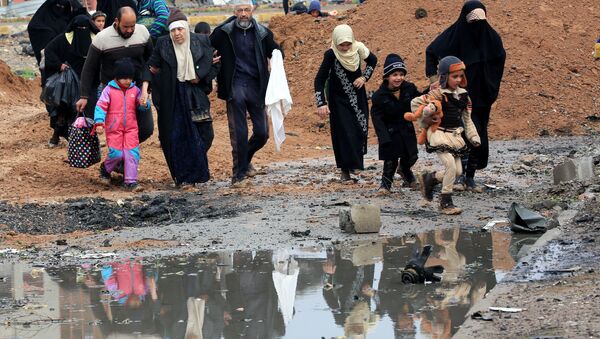The demand comes in the wake of reports that airstrikes carried out in the week commencing March 13 in Mosul killed at least 200 people, many of whom had been advised to remain in the city by local authorities. The destruction was partially acknowledged by the Combined Joint Task Force's press office, but said the strike had in fact "struck ISIS [Daesh] fighters and equipment." The Task Force also pledged to conduct formal investigation.
Iraq: Airstrike Vetting Changes Raise Concerns https://t.co/bBcGM33EXx
— Human Rights Watch (@hrw) March 28, 2017
However, the Iraqi army subsequently denied the coalition was responsible for any civilian casualties, claiming any which had been produced in fact resulted from Daesh-laid improvised explosive devices. No footage or imagery from the site was released.
HRW has called on the coalition to ensure serious violations of the laws of war are appropriately referred for criminal prosecution, and civilian victims or their families receive adequate redress. The group stated previous coalition investigations have not released detailed information on their process, findings, or any disciplinary or compensatory measures taken.
"The coalition should thoroughly and transparently investigate the dozens of civilian deaths, and in the case of wrongdoing, hold those responsible to account. The high number of civilian deaths in recent fighting, as well as recent announcements about changed procedures for vetting airstrikes, raise concerns about the way the battle for west Mosul is being fought," said Lama Fakih, Deputy Middle East Director at Human Rights Watch.
In December 2016, a coalition spokesperson confirmed a US directive that month reduced the number of steps required for coalition troops to authorize and clear airstrikes, with the principal change being the removal of the requirement for the coalition's "strike cell" in Baghdad to clear strikes.
ICYMI — #Mosul, Iraq: civilians killed by coalition airstrikes after being told not to flee https://t.co/XcqbV6UqzM pic.twitter.com/dtiMdaaHBU
— AmnestyUK Media Team (@NewsFromAmnesty) March 29, 2017
HRW stated the net effect of these changes was coalition aircraft were now able to conduct strikes in densely populated areas with less information and time to ascertain the number of civilians who may be injured or killed, fewer measures to verify the target, and fewer recommendations about the appropriate ordinance to use. Trained terminal attack controllers maintain the authority to clear strikes and release ordinance, but reliance on erroneous information may contribute to civilian deaths.
Fakih stated that the changes "almost necessarily" afford civilians fewer protections from being injured or killed, increasing the danger to the very people operations are supposedly meant to protect.
According to our estimates, Belgium's carried out c.400 airstrikes in Iraq and Syria since 2014. MoD says most strikes now at Raqqa & Mosul pic.twitter.com/GGlS38PHn7
— Airwars (@airwars) March 17, 2017
US forces, including those under US Central Command, routinely investigate civilian casualties caused by US forces following a credibility assessment under US Army Regulation (AR) 15-6. Central Command oversees the US-led coalition. HRW said the coalition should ensure it makes public the findings of its investigations into attacks causing civilian casualties and, if it finds serious violations of the laws of war, should refer those responsible for appropriate criminal prosecution.
#Iraq: Evidence points to alarming pattern of US-led coalition airstrikes destroying whole houses w/ families inside https://t.co/3cummxXYr9 pic.twitter.com/wbYH888PHB
— AmnestyInternational (@amnestyusa) March 28, 2017
The findings should include information on accountability measures taken, with explanations, and the redress provided to victims or their families. Previously, neither Central Command investigations into civilian casualties have not provided this information, nor has coalition reporting on investigations. The investigation, HRW said, should not rely solely on internal, assessments from air forces involved, which may underreport civilian casualties, but seek direct testimony from survivors.
"In March alone there have been 816 alleged civilian deaths in Iraq due to U.S.-led airstrikes" https://t.co/FW1be371Xd #Mosul #Iraq #Raqqa pic.twitter.com/pVfFwhBZdi
— Helena (@hlnr_) March 29, 2017
It's not merely US-led forces potentially placing civilian lives in danger — since the operation to retake west Mosul began, HRW has documented Iraqi forces' use of indiscriminate improvised rocket-assisted munitions and heavy artillery in civilian-populated areas. The willingness to use such weapons in civilian-populated areas suggests the Iraqi government is likewise taking fewer precautions to protect civilian life.
Nonetheless, the rights group said coalition can immediately take steps to reduce the risk of civilian casualties — for instance, prohibiting armed forces from conducting indiscriminate attacks and using explosive weapons with wide-area effects in populated areas, limiting the use of indirect fire weapons (such as mortars, artillery, and rockets), and employing select weapons and specific ordinance to minimize civilian casualties to the maximum possible extent.
360° destruction: Western Mosul in ruins after airstrikes (VIDEO) #Iraq https://t.co/YKd9tjnAe3 pic.twitter.com/oDoZrowdUd
— Linda (@FeltersCottage) March 14, 2017
Moreover, terminal attack controllers should maintain the highest level of direct control over each strike, and commanders should review all requests for air and artillery strikes to ensure all targets are legitimate military objectives and the strikes would not cause disproportionate civilian harm compared with the expected military gain. Information regarding the target, the target area, and the presence of civilians or civilian objects must be verified using all available means, including by visual confirmation and the use of various intelligence, surveillance, and reconnaissance platforms.
#Iraq|Photos taken after airstrikes of the international coalition's aircrafts on #Mosul pic.twitter.com/Mpy9XCLg2t
— INP PLUS (@inpplus_eng) March 13, 2017
HRW further noted there have been reports about aerial attacks by US and other coalition forces in Syria, which have also resulted in possibly significant civilian casualties. On March 16, US forces struck a mosque near al-Jinah in Syria's Aleppo governorate, killing dozens. US authorities said the attack targeted and killed members of Al-Qaeda, but residents have told HRW the attack killed civilians almost exclusively. Likewise, on March 21 an airstrike hit a school near Raqqa, again killing dozens of civilians.




